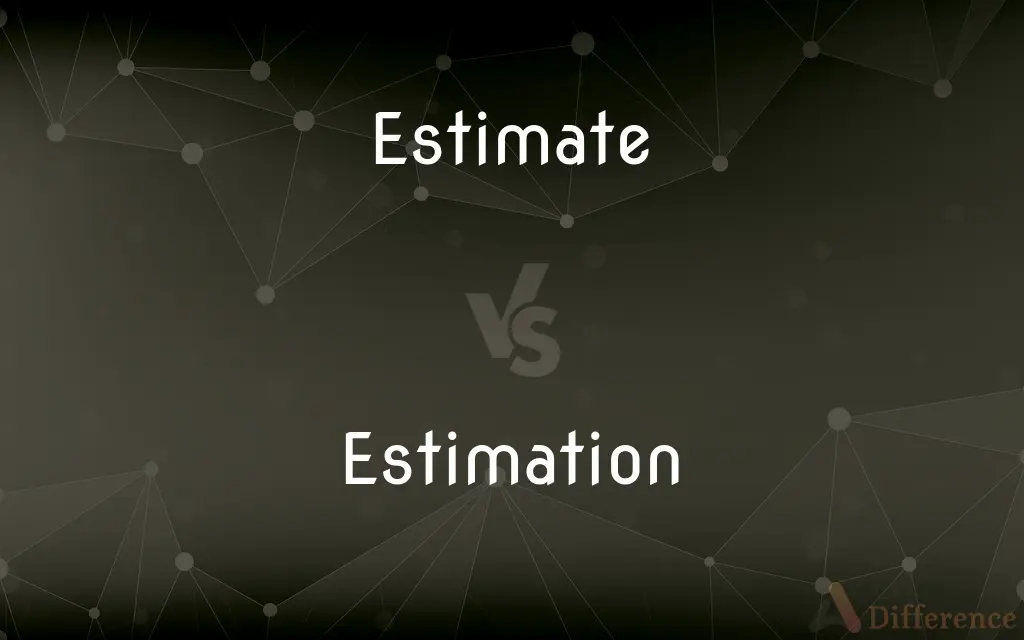Estimate vs. Estimation — What's the Difference?
By Urooj Arif & Maham Liaqat — Updated on March 7, 2024
An estimate is a rough calculation or judgment, while estimation is the process or act of making such a calculation.

Difference Between Estimate and Estimation
Table of Contents
ADVERTISEMENT
Key Differences
Estimate often refers to the resultant figure or judgment arrived at after evaluating available information, serving as a tentative value for something that is not precisely known. On the other hand, estimation involves the act or methodology employed to arrive at such a figure, encompassing the techniques, considerations, and assumptions used in the process, highlighting the procedural aspect of making an educated guess.
In the context of mathematics or statistics, an estimate is a specific value derived to represent a parameter of a population, such as the mean or proportion. Estimation, however, refers to the entire set of methods and processes used to determine such values, including sampling, data analysis, and the application of statistical models, underscoring the distinction between the outcome and the methodological framework.
In everyday language, when someone says they have an estimate for the time it will take to complete a task, they are referring to a specific duration they have in mind. The process they went through to arrive at that time frame, considering factors like task complexity and their own availability, represents estimation, illustrating the difference between a specific outcome and the cognitive process behind it.
In project management, an estimate can be crucial for budgeting and planning, representing a quantified expectation of resource expenditure. Estimation, in this context, is the comprehensive activity that includes evaluating project scope, tasks, historical data, and potential risks, demonstrating how an estimate is the product of the estimation process.
In business or economics, an estimate might refer to a forecasted figure, such as sales for the next quarter. The process of estimation here would involve market analysis, trend examination, and consideration of economic factors, indicating the analytical approach leading to the forecast.
ADVERTISEMENT
Comparison Chart
Definition
A rough calculation or judgment of value, quantity, or extent.
The act or process of making an estimate, involving evaluation and analysis.
Context
Resultant figure or judgment.
Methodology or process employed.
In Mathematics/Statistics
Specific value representing a population parameter.
Set of methods to determine estimates, including sampling and modeling.
Everyday Use
Specific duration or quantity expected.
Cognitive process considering various factors to arrive at an estimate.
In Project Management
Quantified expectation of resources needed.
Activity including scope evaluation, risk assessment, and historical data analysis.
Compare with Definitions
Estimate
An approximate judgment or opinion.
His estimate of the situation was that it would resolve quickly.
Estimation
The act of calculating or judging something's value or number.
Estimation of the project's cost took several days.
Estimate
A rough calculation of quantity, degree, or worth.
The contractor's estimate for the renovation was $10,000.
Estimation
The process or technique of making estimates.
His skill in estimation saved the company money.
Estimate
A statement of the approximate charge for work to be done.
She received three estimates for the painting job.
Estimation
The methodology employed in determining quantities or extents.
The team used statistical estimation to predict sales.
Estimate
A calculated guess in the absence of exact knowledge.
My estimate is that we'll need about five gallons of paint.
Estimation
Estimation involves the procedural aspects of deriving estimates.
Estimation techniques vary widely across different industries.
Estimate
Estimate implies a specific outcome or figure derived.
The project's time estimate was two weeks.
Estimation
Consideration and analysis to arrive at an approximate figure.
Proper estimation requires understanding of the project's scope.
Estimate
To form an opinion about; evaluate
"While an author is yet living we estimate his powers by his worst performance" (Samuel Johnson).
Estimation
Estimation (or estimating) is the process of finding an estimate, or approximation, which is a value that is usable for some purpose even if input data may be incomplete, uncertain, or unstable. The value is nonetheless usable because it is derived from the best information available.
Estimate
To calculate approximately (the amount, extent, magnitude, position, or value of something).
Estimation
The act or an instance of estimating
Estimation of the storm damage took weeks.
Estimate
A tentative evaluation or rough calculation, as of worth, quantity, or size
An estimate of the damage caused by the storm.
Estimation
The amount, extent, position, size, or value reached in an estimate
The cost estimation is $500.
Estimate
A statement of the approximate cost of work to be done, such as a building project or car repairs.
Estimation
An opinion or judgment
In my estimation, that is a good book.
Estimate
A judgment based on one's impressions; an opinion
I have a high estimate of his character.
Estimation
Favorable regard; esteem
Held her teacher in high estimation.
Estimate
A rough calculation or assessment of the value, size, or cost of something.
Estimation
The process of making an estimate.
According to my estimations, we should get to the border in five hours, give or take.
The publisher made an estimation on the potential value of the new novel.
Estimate
(construction and business) A document (or verbal notification) specifying how much a job is likely to cost.
Estimation
The amount, extent, position, size, or value reached in an estimate.
Estimate
An upper limitation on some positive quantity.
Estimation
Esteem or favourable regard.
With that performance last night, you've gone up in the director's estimation.
Estimate
To calculate roughly, often from imperfect data.
Estimation
The act of estimating.
Estimate
To judge and form an opinion of the value of, from imperfect data.
Estimation
An opinion or judgment of the worth, extent, or quantity of anything, formed without using precise data; valuation; as, estimations of distance, magnitude, amount, or moral qualities.
If he be poorer that thy estimation, then he shall present himself before the priest, and the priest, and the priest shall value him.
Estimate
To judge and form an opinion of the value of, from imperfect data, - either the extrinsic (money), or intrinsic (moral), value; to fix the worth of roughly or in a general way; as, to estimate the value of goods or land; to estimate the worth or talents of a person.
It is by the weight of silver, and not the name of the piece, that men estimate commodities and exchange them.
It is always very difficult to estimate the age in which you are living.
Estimation
Favorable opinion; esteem; regard; honor.
I shall have estimation among multitude, and honor with the elders.
Estimate
To from an opinion of, as to amount,, number, etc., from imperfect data, comparison, or experience; to make an estimate of; to calculate roughly; to rate; as, to estimate the cost of a trip, the number of feet in a piece of land.
Estimation
Supposition; conjecture.
I speak not this in estimation,As what I think might be, but what I know.
Estimate
A valuing or rating by the mind, without actually measuring, weighing, or the like; rough or approximate calculation; as, an estimate of the cost of a building, or of the quantity of water in a pond.
Weigh success in a moral balance, and our whole estimate is changed.
No; dear as freedom is, and in my heart'sJust estimation prized above all price.
Estimation
An approximate calculation of quantity or degree or worth;
An estimate of what it would cost
A rough idea how long it would take
Estimate
An approximate calculation of quantity or degree or worth;
An estimate of what it would cost
A rough idea how long it would take
Estimation
A document appraising the value of something (as for insurance or taxation)
Estimate
A judgment of the qualities of something or somebody;
Many factors are involved in any estimate of human life
In my estimation the boy is innocent
Estimation
The respect with which a person is held;
They had a high estimation of his ability
Estimate
A document appraising the value of something (as for insurance or taxation)
Estimation
A judgment of the qualities of something or somebody;
Many factors are involved in any estimate of human life
In my estimation the boy is innocent
Estimate
A statement indicating the likely cost of some job;
He got an estimate from the car repair shop
Estimate
The respect with which a person is held;
They had a high estimation of his ability
Estimate
Judge tentatively or form an estimate of (quantities or time);
I estimate this chicken to weigh three pounds
Estimate
Judge to be probable
Common Curiosities
What is the key difference between an estimate and estimation?
The key difference is that an estimate is the end result, a specific calculated figure, while estimation is the process or methodology used to arrive at that figure.
Can estimation exist without producing an estimate?
In practice, the process of estimation aims to produce an estimate, but it's possible for the process to be inconclusive or ongoing without a final estimate being determined.
Why is it important to differentiate between an estimate and estimation in professional settings?
Differentiating between the two is important in professional settings to clarify whether the discussion is about the result of the calculation (the estimate) or about the method and process used to arrive at that result (estimation), which can impact project planning, execution, and communication.
Is an estimate always a numerical value?
While estimates are often numerical, they can also be non-quantitative judgments or opinions, especially in less formal contexts.
How important is accuracy in estimation?
Accuracy in estimation is crucial, especially in fields like construction, project management, and finance, as it directly impacts planning, budgeting, and decision-making.
Can the terms estimate and estimation be used interchangeably?
In casual use, the terms might be used interchangeably, but technically, they refer to different aspects—the outcome versus the process.
Can technology improve estimation accuracy?
Yes, technology, such as software tools and analytical models, can significantly improve estimation accuracy by providing more sophisticated means of data analysis, simulation, and historical comparison.
How does one handle uncertainty in estimation?
Uncertainty can be handled by incorporating risk analysis, using ranges instead of single-point estimates, continuously updating estimates with new information, and employing probabilistic modeling.
What role does intuition play in estimation?
Intuition, based on experience and expertise, can play a significant role, especially when data is limited or the situation is highly unique, but it should ideally be complemented with more objective methods.
How can one improve the process of estimation?
Improving estimation can involve using more reliable data, employing advanced estimation techniques, gaining better understanding of the task or project, and learning from past estimation successes or failures.
Is it better to overestimate or underestimate?
This depends on the context; however, both can have drawbacks. Overestimating might lead to excess resource allocation, while underestimating could result in insufficient resources. A balanced approach that includes risk assessment is often preferred.
Are there standard practices for making estimates?
While there are general guidelines and best practices, standard practices can vary widely among different industries and fields, depending on the specific needs and challenges of each.
What factors influence the accuracy of an estimate?
The accuracy of an estimate can be influenced by the availability and quality of data, the complexity of what's being estimated, the estimator's experience and skills, and the methodologies or tools used in the estimation process.
What is the significance of contingency in estimates?
Contingency is significant as it provides a buffer for unforeseen circumstances or errors in the estimate, helping to ensure that the project or task can be completed within the scope of the overall estimation.
How do cultural differences impact estimation?
Cultural differences can impact estimation in terms of communication styles, risk tolerance, and decision-making processes, potentially leading to variations in how estimates are calculated, interpreted, and used.
How can one communicate estimates effectively?
Effective communication of estimates involves clarity about the level of accuracy, the assumptions made, the potential for variance, and the underlying data or processes used, ensuring stakeholders have a realistic understanding.
What is the difference between a rough estimate and a detailed estimate?
A rough estimate provides a broad, general idea of the value or cost, often with limited data, while a detailed estimate involves more comprehensive data and analysis, offering a more precise figure.
How frequently should estimates be reviewed or updated?
Estimates should be reviewed and updated regularly, especially as new information becomes available or as project parameters change, to ensure they remain accurate and relevant.
How do external factors, like market trends or economic conditions, affect estimates?
External factors can have a significant impact on estimates, especially for long-term projects or forecasts, as they can change the underlying assumptions or conditions used in the estimation process.
Can estimates affect stakeholder expectations?
Yes, estimates can significantly affect stakeholder expectations, as they often form the basis for planning, budgeting, and evaluating project success or failure.
Share Your Discovery

Previous Comparison
Sis vs. Sister
Next Comparison
Accessory vs. AccompliceAuthor Spotlight
Written by
Urooj ArifUrooj is a skilled content writer at Ask Difference, known for her exceptional ability to simplify complex topics into engaging and informative content. With a passion for research and a flair for clear, concise writing, she consistently delivers articles that resonate with our diverse audience.
Co-written by
Maham Liaqat















































